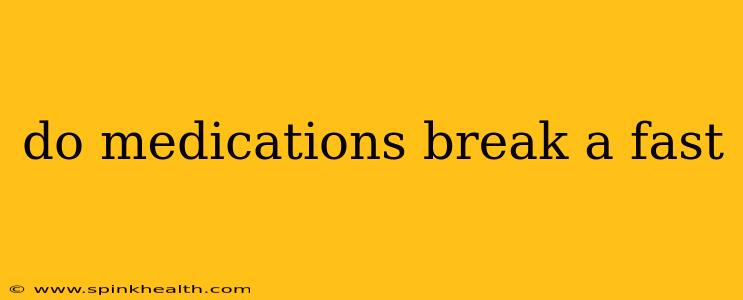Do Medications Break a Fast? Navigating the Complexities of Fasting and Medication
The question of whether medications break a fast is a surprisingly nuanced one, far from a simple yes or no. It depends heavily on the type of fast you're observing, the specific medication, and its formulation. Let's unravel this complexity, starting with a story.
Imagine Sarah, diligently following a 16/8 intermittent fasting plan. She meticulously tracks her eating window, striving for optimal health benefits. But she also takes medication for her blood pressure, a daily necessity. Does this daily pill derail her fasting efforts? The answer, as we'll explore, is: it might, and it might not.
What is Considered "Breaking" a Fast?
Before we delve into specific medications, let's define what constitutes breaking a fast. Generally, a fast is considered broken when you consume calories exceeding a certain threshold—typically 50 calories or more. This isn't a rigid rule, however, and some fasting protocols have more flexible guidelines.
It's crucial to differentiate between different types of fasting. Some are calorie-restricted, meaning any calorie intake breaks the fast. Others focus on specific time windows, where the focus is on the duration of food abstinence rather than the total calorie count.
Which Medications Might Break a Fast?
Many medications are formulated with inactive ingredients or "excipients" that can contain calories. These are often minimal, but they can add up, especially if you're taking multiple medications.
Examples of medications that might contribute to breaking a fast include those formulated with:
- Sugars: Some liquid medications, particularly syrups, contain significant sugar content, clearly exceeding the 50-calorie threshold.
- High-fructose corn syrup: This common sweetener is also a frequent excipient and can substantially increase caloric intake.
- Other carbohydrates: Some tablets might contain small amounts of starches or other carbohydrates as binders.
However, many other medications, particularly those in tablet or capsule form, contain negligible calories. These likely won't impact your fast significantly.
What About Different Types of Fasting?
The impact of medication on your fast also depends on the type of fast you are observing.
- Intermittent Fasting (IF): With IF, the focus is on the timing of eating. A low-calorie medication might not significantly impact your fast, especially if it falls within your fasting window.
- Calorie Restriction Fasting: Here, the goal is a specific calorie reduction. Even a low-calorie medication technically contributes to your daily calorie intake and could be considered breaking the fast.
- Water Fasting: Any caloric intake, no matter how small, technically breaks a water fast.
Do Medications Affect the Benefits of Fasting?
Even if a medication doesn't technically break your fast, it could still affect the potential benefits you're seeking. Fasting initiates metabolic processes like autophagy (cellular cleansing) and can improve insulin sensitivity. The effect of your medications, regardless of their caloric content, could influence the efficiency of these processes. This is highly individual and depends on your specific medications and health status.
Should I Talk to My Doctor?
Before altering your medication regimen based on fasting, it’s crucial to consult your doctor or pharmacist. They can provide personalized advice about your medications and fasting practices. They can help determine if any interactions could occur between the medication and fasting and assess if any adjustments are needed.
Conclusion: It's Complicated
The impact of medication on fasting is multifaceted. While many medications won't significantly impact a fast, others, especially those in liquid formulations or containing significant sugars, might. Ultimately, understanding your specific medications, their composition, and the type of fast you're undertaking is paramount. Communication with your healthcare provider ensures you approach fasting safely and effectively.

